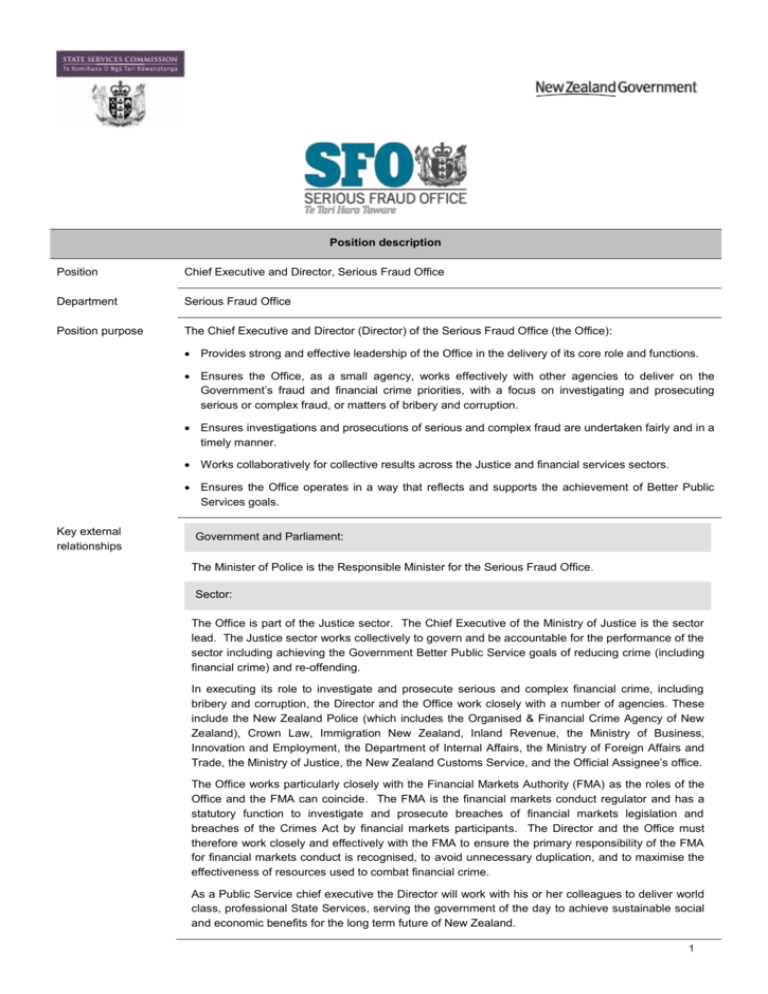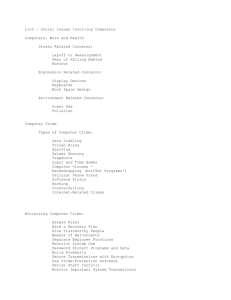
Position description
Position
Chief Executive and Director, Serious Fraud Office
Department
Serious Fraud Office
Position purpose
The Chief Executive and Director (Director) of the Serious Fraud Office (the Office):
Provides strong and effective leadership of the Office in the delivery of its core role and functions.
Ensures the Office, as a small agency, works effectively with other agencies to deliver on the
Government’s fraud and financial crime priorities, with a focus on investigating and prosecuting
serious or complex fraud, or matters of bribery and corruption.
Ensures investigations and prosecutions of serious and complex fraud are undertaken fairly and in a
timely manner.
Works collaboratively for collective results across the Justice and financial services sectors.
Ensures the Office operates in a way that reflects and supports the achievement of Better Public
Services goals.
Key external
relationships
Government and Parliament:
The Minister of Police is the Responsible Minister for the Serious Fraud Office.
Sector:
The Office is part of the Justice sector. The Chief Executive of the Ministry of Justice is the sector
lead. The Justice sector works collectively to govern and be accountable for the performance of the
sector including achieving the Government Better Public Service goals of reducing crime (including
financial crime) and re-offending.
In executing its role to investigate and prosecute serious and complex financial crime, including
bribery and corruption, the Director and the Office work closely with a number of agencies. These
include the New Zealand Police (which includes the Organised & Financial Crime Agency of New
Zealand), Crown Law, Immigration New Zealand, Inland Revenue, the Ministry of Business,
Innovation and Employment, the Department of Internal Affairs, the Ministry of Foreign Affairs and
Trade, the Ministry of Justice, the New Zealand Customs Service, and the Official Assignee’s office.
The Office works particularly closely with the Financial Markets Authority (FMA) as the roles of the
Office and the FMA can coincide. The FMA is the financial markets conduct regulator and has a
statutory function to investigate and prosecute breaches of financial markets legislation and
breaches of the Crimes Act by financial markets participants. The Director and the Office must
therefore work closely and effectively with the FMA to ensure the primary responsibility of the FMA
for financial markets conduct is recognised, to avoid unnecessary duplication, and to maximise the
effectiveness of resources used to combat financial crime.
As a Public Service chief executive the Director will work with his or her colleagues to deliver world
class, professional State Services, serving the government of the day to achieve sustainable social
and economic benefits for the long term future of New Zealand.
1
Communities and the public:
As reputable capital markets are crucial to the maintenance of a strong economy, the Director
needs to be able to actively engage with business leaders, to understand the environment within
which they operate and to reinforce to business leaders their legal and ethical obligations.
In relation to the detection, investigation and prosecution of serious and complex fraud, the Director
is required to work closely and appropriately with the judiciary, the legal profession, other agencies
performing similar functions and relevant agencies from other jurisdictions.
Performance profile
Critical areas of success
The Government is focussed on preventing crime and ensuring there are fewer victims of crime,
including financial crime. Over the next three to five years the Director will be required to:
Contribute to the achievement of the Justice Sector’s Better Public Services targets to, by 2017:
o Reduce the crime rate by 15%
o Reduce the violent crime rate by 20%
o Reduce the youth crime rate by 5%
o Reduce the reoffending rate by 25%
Accountabilities
Act independently to determine whether to investigate and prosecute individual cases. Provide
an agile investigative and prosecutorial capability and capacity that is well regarded, sustainable
and works effectively with other agencies.
Provide efficient law enforcement action through the sharing of resources and powers by all
agencies engaged in combating financial crime, including best utilisation of SFO’s forensic skills
and investigative resources with those agencies to ensure there is an all-of-government response
to serious or complex fraud and financial crime.
Use the SFO’s wealth of knowledge to assist in the development of policy advice on the
prevention and detection of economic and financial crime.
Play a lead role in increasing the effectiveness of the wider Justice sector responses to serious
and complex fraud including financial crime and corruption.
Build and maintain strong, effective relationships with State Sector colleagues, including having
strong networks in Wellington.
Excellent leadership by public service chief executives is essential to high performing departments
and a high performing public service. Chief executives are required to work collaboratively in a spirit
of service and strive towards the overall goal of a system of world class, professional State Services,
serving the government of the day and meeting the needs of all New Zealanders. As a chief
executive in the New Zealand public service you will be accountable for:
the Office carrying out the purpose of the Serious Fraud Office Act 1990, the State Sector Act
1988, the Public Finance Act 1989, and other relevant statutes and legislation.
the Office’s response on matters relating to the collective interests of government.
the stewardship of the Office, including of its medium and long-term sustainability,
organisational health, capability, and capacity to offer free and frank advice to successive
Governments.
the stewardship of the assets and liabilities that are used by or relate to the Office, and the
legislation administered by the Office.
giving effect to whole of government requirements on matters such as procurement, property
management, ICT, security and privacy.
the performance of the functions and duties and the exercise of the powers of the Office.
the tendering of free and frank advice to Ministers.
the integrity and conduct of the Office’s employees, the efficient and economical delivery of the
services provided by the Office, and how effectively those services contribute to the intended
outcomes.
The Director is accountable to the Minister of Police, who is the Responsible Minister for the Serious
Fraud Office.
2
The Director is accountable for:
Ensuring that the work of the Office continues to build public confidence in the Office and the
rule of law. The Director must be able to work collaboratively and effectively with senior
executives in other agencies to maximise the impact of the Office.
Providing high quality services and demonstrating ongoing performance improvement with
regards to timeliness, quality and quantity.
Providing leadership, effective management and development of the Office, so that it
contributes to the achievement of the Government’s priorities.
Person profile
Position specific
competencies
The descriptors1 below summarise the competencies in which the Director will need to be
skilled.
Operating skills
The Director will create focus to get things done. They understand organisational
processes, and how to separate and combine tasks into an efficient work flow. They see
opportunities for synergy and integration. They use teams to work across boundaries and
accomplish integrated tasks, and sustained coordinated efforts. They continually support
the development of their senior team; defining success in terms of the whole team,
coaching individuals and providing opportunities that will stretch them.
Strategic skills
The Director will be intellectually sharp, and have a strong grasp of key trends and issues
facing the Office, the financial services system and the wider state sector, and develop long
range strategies and plans. They learn quickly when facing new problems and are
comfortable handling risk and uncertainty. They can easily pose future scenarios and take
a broad perspective on issues, analysing both successes and failures for clues about how
to improve. They create a compelling vision and inspire others to support that vision.
Organisational positioning
skills
The Director will understand the political and organisational context within which they work.
They are sensitive to political processes and anticipate risks and how others may respond.
They can manoeuvre through complex political situations effectively and quietly whilst
maintaining public service standards of political neutrality. They know how to get things
done within the political and organisational context and understand the origin and reasoning
behind key policies, practices and procedures.
Energy and drive
The Director consistently demonstrates energy and drives for better results. They
consistently and constantly strive for better performance, balanced with a concern for
people and due process.
Personal and interpersonal
skills
The Director will have highly developed personal and interpersonal skills.
They know themselves well, are open to criticism, and seek feedback. They learn from
their mistakes and strive constantly to develop themselves. They can be counted on to
remain calm and hold things together in tough times.
They are a good listener and can establish rapport with people from all walks of life. They
build relationships of trust and respect, can be direct and diplomatic and resolve differences
without damaging relationships. They are collaborative and value others’ contributions.
They are dedicated to meeting the expectations and requirements of Ministers and act
consistently with those expectations and requirements in mind.
Courage
1
The Director can be counted on to step up when times are tough. If conflict arises they look
for common ground, resolving differences equitably and calmly. They are willing to take the
lead on controversial issues. They read situations and people accurately. They are a good
judge of people and are able to clearly see their strengths and limitations.
These skill descriptions are based on Lominger International’s LEADERSHIP ARCHITECT Competency Sort Cards, Copyright 1992, 1996,
2001-2003 Lominger Limited, Inc., a subsidiary of Korn/Ferry International ALL RIGHTS RESERVED, and are used with the express permission of
Lominger International.”
3
Acting with honour and
integrity
Effective chief executives adhere to the Standards of Integrity and Conduct for the State
Services, during both good and bad times. As well as taking a lead role in promoting the
Standards, they role model the ethics, values and behaviours set out in the Standards.
They deliver on their promises and are direct and truthful in their dealings with others.
Security Clearance
Appointment will be subject to a New Zealand Government Secret security clearance.
Information on Serious Fraud Office outcomes, organisational structure, dimensions and appropriations can be found in
the Statement of Intent 2012-15 and the Annual Report to 30 June 2012. The following links are to these documents on
the Serious Fraud Office website:
http://www.sfo.govt.nz/statement-of-intent
http://www.sfo.govt.nz/annual-reports
The Office is responsible for administering the Serious Fraud Office Act 1990.
4





